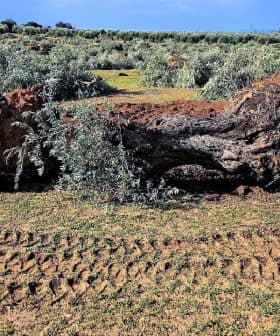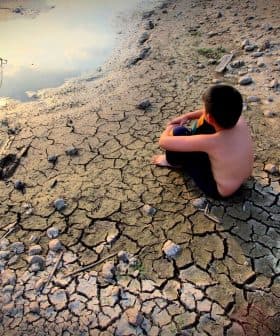Temperatures Rising in Africa Faster than Global Average

The State of the Climate in Africa 2021 report from the World Meteorological Organization highlights the significant impact of rising temperatures on agriculture and food security in Africa, with severe consequences for several countries. The report also emphasizes the increasing frequency of extreme heat events, wildfires, floods, and droughts on the continent, as well as the urgent need for robust early warning systems to strengthen resilience and adaptation capacities in the face of climate change.
Surface temperatures in Africa rose more than the global average in 2021, making last year one of the hottest on record for the continent.
According to the State of the Climate in Africa 2021 report, published by the World Meteorological Organization, rising temperatures contributed to heatwaves, wildfires, extensive floods and lakes evaporating, all posing severe consequences for people, biodiversity and agriculture in several countries.
It is imperative for the continent to accelerate efforts to establish robust regional and national early warning systems and climate services for climate-sensitive sectors.
The impact of climate change on agriculture is formidable in Africa. Since 1961, steadily rising temperatures have reduced the development of African agricultural productivity by 34 percent.
According to the report, the trend is likely to continue with severe consequences for food security.
See Also:Mediterranean Agricultural Biodiversity at Risk, Report FindsIn a scenario where global temperatures increase 1.5 °C above pre-industrial levels, experts believe that West Africa would lose at least 9 percent of its maize yield, with wheat yields destined to decline between 20 to 60 percent in southern and northern Africa.
Researchers also noted that North Africa, the continent’s largest olive-growing region, is experiencing a more significant and rapid temperature rise.
Temperatures in North Africa grew twice as quickly from 1991 to 2001 as they did from 1961 to 1990, and almost twice the global rate for the same period.
In Tunisia, traditionally the largest olive-producing country outside of Europe, the summer of 2021 was the hottest since 1950, with temperatures exceeding the 1981 to 2010 average by 2.65 °C.
Two heatwaves enveloped the country, with peaks of 49.9 °C in Tozeur and 50.3 ºC in Kairouan, one of Tunisia’s most relevant olive-growing regions.
In northern Africa, precipitation patterns were also highly anomalous in 2021. Above-average precipitation reported in northeastern Egypt was accompanied by below-average rainfall in Morocco, Tunisia and northwestern Libya.
Stoked on by the dry weather, wildfires raged across Algeria and Tunisia, where thousands of hectares of fruit trees were lost, and thousands of farm animals died.
The WMO confirmed that the frequency of extreme heat events on the continent is increasing, with the hottest days on records all happening in the past few years.
Food security has been jeopardized in many areas. People in several regions have been forced to leave their homes due to extreme weather events, such as the floods in South Sudan, Nigeria and the Democratic Republic of the Congo. Besides North Africa, severe droughts have been reported in the Sahel, East Africa and Madagascar.
Additionally, rising sea levels in 2021 impacted low-lying coastal cities and increased the salinity of coastal farming zones, accelerating erosion and worsening coastal flooding. According to the report, 108 to 116 million people will be at risk of rising sea levels by 2030.
Scientists and climate experts that authored the report emphasized how the constant increase in water consumption will add pressure to water demand and water resources that are already scarce.
The situation is exacerbated by droughts and heat waves, which are predicted to become longer and more severe over time.
“Disruptions in water availability will impede access to safe water. In addition, limited water availability and water scarcity are expected to trigger conflicts among people who are already contending with economic challenges,” the report reads.
WMO data show that 418 million people do not have access to a “basic level of drinking water,” with 779 million not having access to “basic sanitation services.”
According to the report, mountain glaciers on the continent continue to recede. In a few cases, such as Mount Kilimanjaro, 85 percent of the ice cover has been lost in the last century.
Several significant glaciers are set to disappear in a matter of years. River discharge is progressively reducing in most countries.
The new report, compiled in association with the African Union Commission and several international agencies, is the third of a series and focuses on water resources. It provided climate analysis, identified hydro-meteorological events, impacts and risks, and suggested “climate actions” considered crucial to strengthen African nations’ resilience to climate change.
According to scientists, climate change is fueled by greenhouse gas emissions produced by human activities around the world. However, African countries account for only 2 to 3 percent of those emissions.
At the recent Africa Adaptation Summit in the Netherlands, African leaders fiercely criticized the absence of leaders from industrialized countries responsible for the vast majority of emissions.
According to reporting from the North Africa Post, the Senegalese president and African Union chief Macky Sall warned that climate change not only concerns “the fate of Africa… but the fate of humanity and the future of the planet.”
More than 83 percent of national climate plans in Africa include greenhouse gas reduction targets, focusing on energy, agriculture, waste, land use and forestry.
“It is imperative for the continent to accelerate efforts to establish robust regional and national early warning systems and climate services for climate-sensitive sectors in order to strengthen climate resilience and adaptation capacities,” wrote Petteri Taalas, WMO’s secretary general, introducing the report.
The WMO estimates that less than 40 percent of Africans have access to early warning systems to protect against extreme weather events and climate change impacts.









